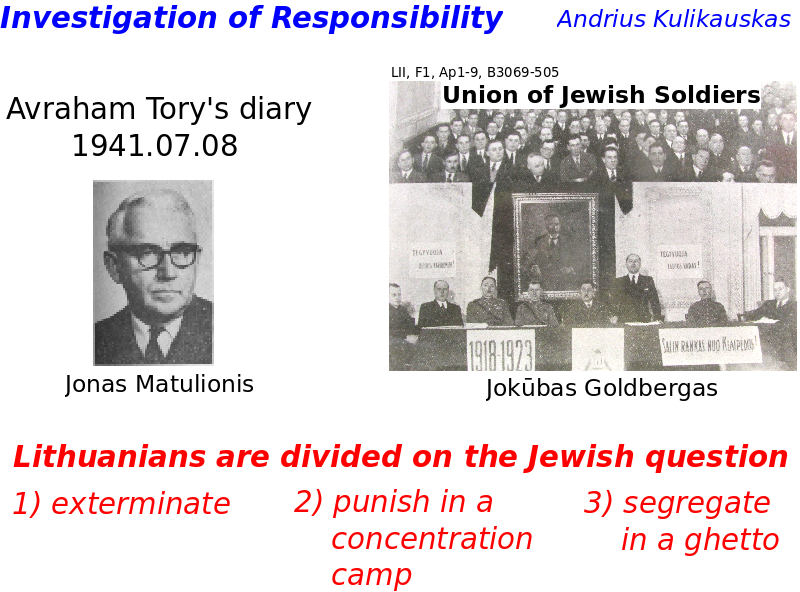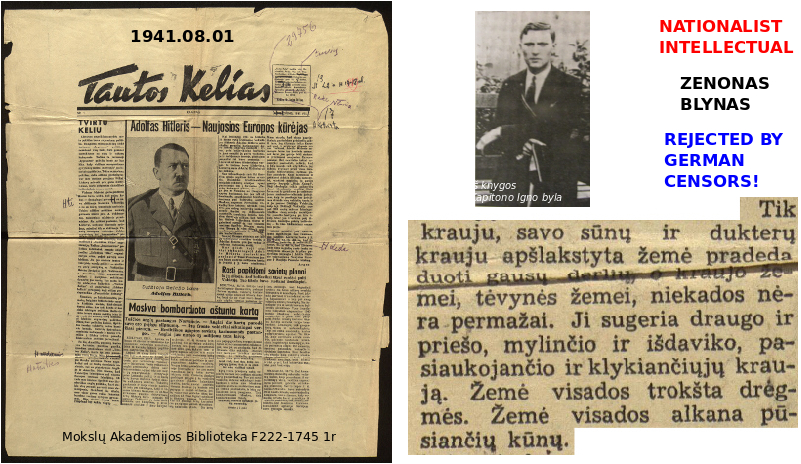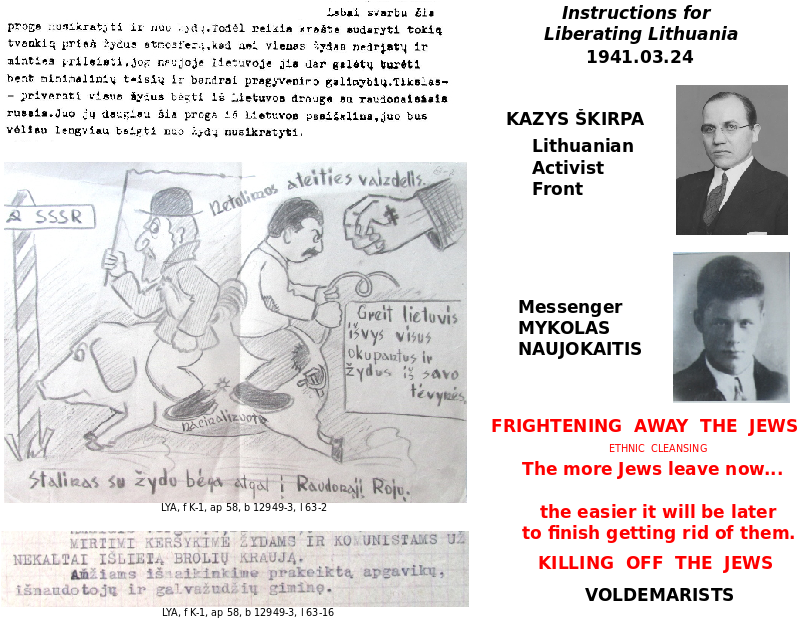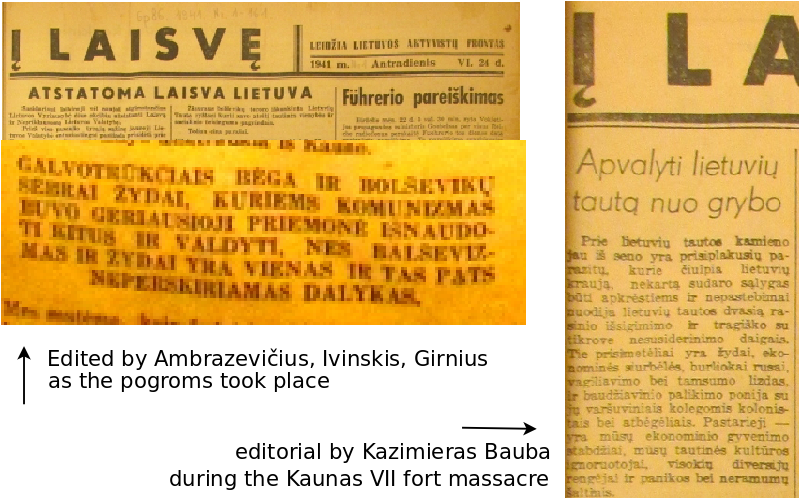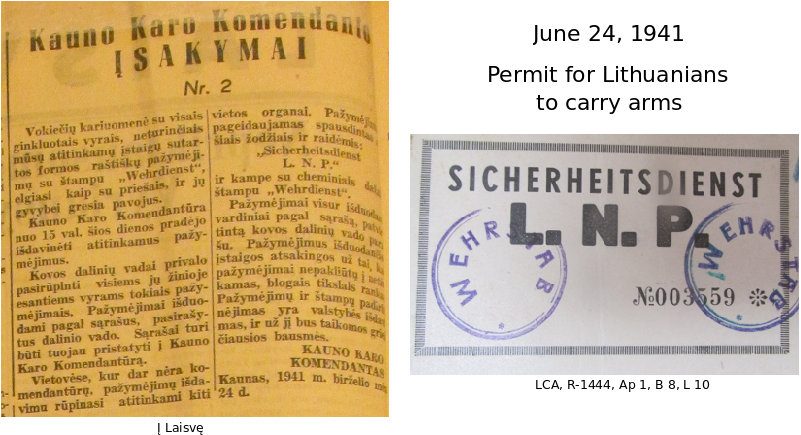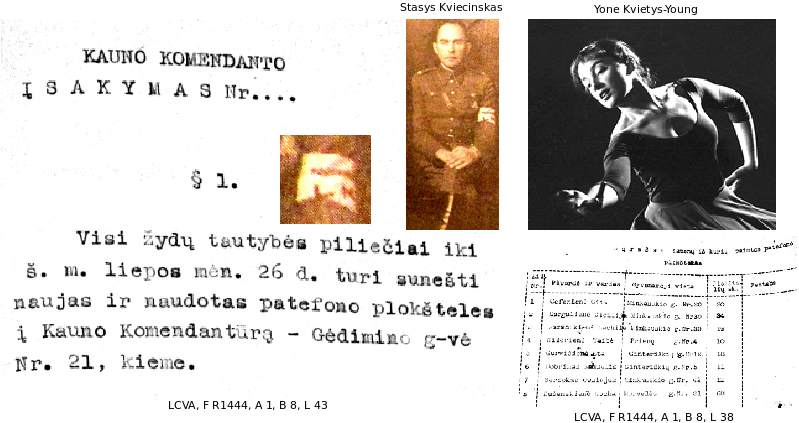O P I N I O N / H I S T O R Y
by Andrius Kulikauskas
◊
Iwill speak about painful things, and so I understand if some of you won’t want to listen and will step out.
It is most important that we empathize with the victims of the Holocaust, and yet we must also empathize with the perpetrators if we wish to understand what happened and who was responsible for what. Litvaks outside of Lithuania feel hurt that Lithuanians shirk responsibility for the Holocaust.
I won’t be indifferent. I am a deliberate Lithuanian. I was born in the diaspora. I chose to be Lithuanian. Is the Lithuanian worldview harmful? I must investigate.
How did Lithuanians wrong Litvaks?
In Saturday school I was mistakenly taught that few Lithuanians participated. They were the dregs of society. They were forced to kill. The killings took place at the end of the war, in the ghettos.
◊
◊
Avraham Tory’s diary entry for July 8th, 1941 reveals the actual truth. Two weeks after the start of the war, the Finance Minister of Lithuania’s Provisional Government, Jonas Matulionis, explained to the Chairman of the Board of the Union of Jewish Soldiers, Jokūbas Goldbergas:
The Lithuanians are divided on the Jewish question. There are three main views: according to the most extreme view all the Jews in Lithuania must be exterminated; a more moderate view demands setting up a concentration camp where Jews will atone with blood and sweat for their crimes against the Lithuanian people. As for the third view? I am a practicing Roman Catholic; I — and other believers like me — believe that no person may take the life of another person like himself. Only God may do this. I have never been against anybody, but during the period of Soviet rule I and my friends realized that we did not have a common path with the Jews and never will. In our view, the Lithuanians and the Jews must be separated from each other and the sooner the better. For this purpose, the Ghetto is essential. There you will be separated and no longer able to harm us. This is a Christian’s position.
I will name these Lithuanians. However, most importantly, I will explain how to determine responsibility for historical events.
To what extent are Lithuanians responsible for the genocide of Lithuania’s Jews?
Asking pointed questions, I got answers from 500 sources and 25,000 photos of documents.
Let us consider the bigger picture.
What happened and who was responsible?
◊
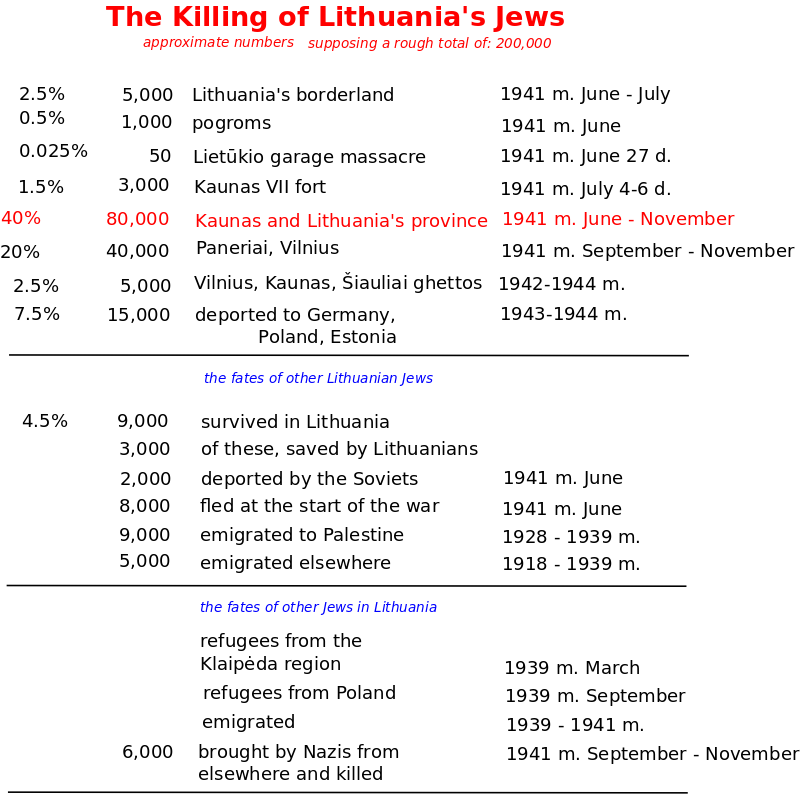
◊
Jews were injured in every way. They were killed off, tortured, raped, enslaved, imprisoned, robbed, segregated, demeaned and their heritage was destroyed.
I care most that the Jews were killed off.
What is the evidence? There are 229 mass graves in Lithuania. My own grandfather, Jonas Kulikauskas, a Communist from the village of Gižai, lies in the mass grave in Vilkaviškis.
Which of the killings should we consider? Jews were murdered in the pogroms, along the Lithuanian border, at Paneriai, and in the ghettos. However, I choose to focus on the main calamity, the killing off of the Jews in Kaunas and the shtetls, the Jewish communities, throughout what had been independent Lithuania before the Soviet-occupation in June, 1940, not including Vilnius or Klaipeda and their surroundings.
◊
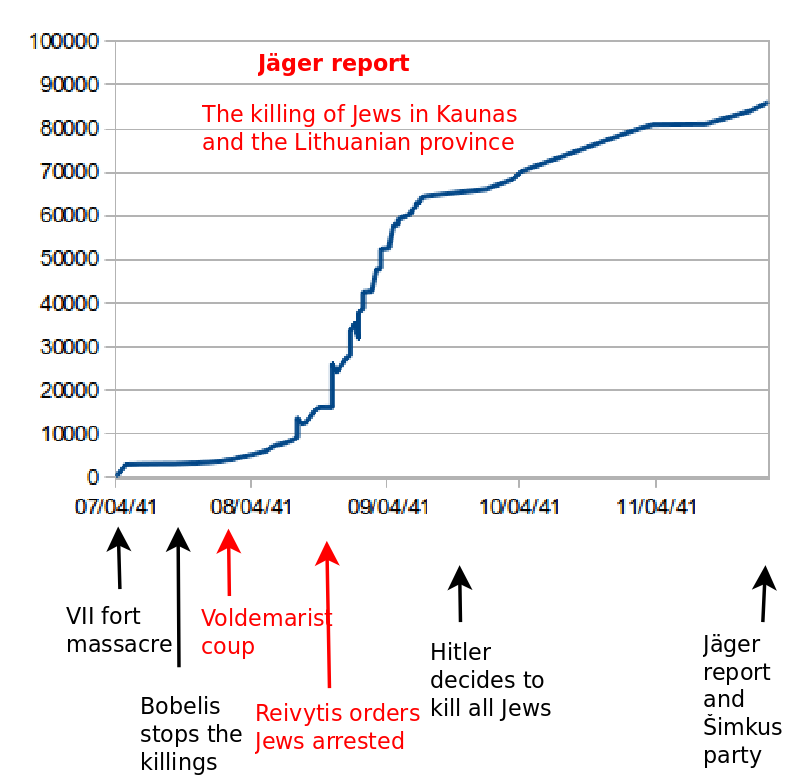
◊
Who is responsible?
If we know who is most responsible, then we will understand how others contributed.
Who took responsibility? SS officer Karl Jaeger. His report of the killings confirms that the task assigned was completed. He matched his word with his deed.
Kaunas commissar Cramer confronted Jaeger about the killings, but was shown the door — I have my job, you do your job.
And yet, was Jaeger most responsible?
How dedicated was he?
Not so much.
Jaeger took a stand and followed through. But did he reflect? Did he learn, did he improve? Not so much. He learned about his duties just a few days before the Nazi invasion of the Soviet Union on June 22, 1941. He did not think up the genocide of the Jews. After it all, he was sorry that he was in charge.
Who took a stand to kill off Lithuania’s Jews, carried that out and kept rethinking it anew?
◊
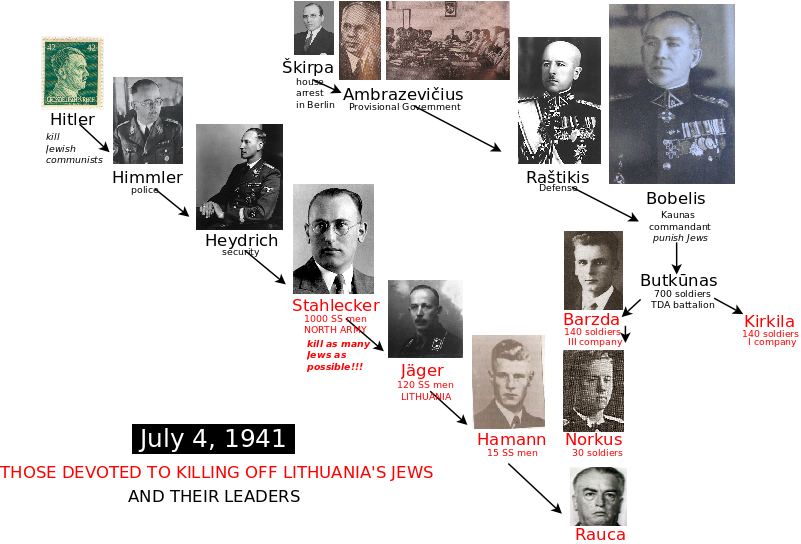
◊
Jaeger’s superior Franz Walter Stahlecker started three campaigns of mass murder in Lithuania in the first week of the war. His SS officers led the killing of Jews along Lithuania’s border. He personally incited Lithuanian Voldemarists to lead pogroms in Kaunas. He chose Hamann to lead a squad of fifteen SS men who with the help of the Lithuanian battalion that summer and fall shot all of the Jews in Lithuania’s province, the cities, towns and countryside outside of Kaunas.
Stahlecker strove to overcome obstacles. The administrators of Šiauliai refused to allow the Jews there to be killed. Lohse, Reichskomissar of Ostland, protected the Jews of the ghettos so that they would work as slaves.
Did Stahlecker act of his own initiative? He killed off the Jews of the Baltic countries earlier than did the leaders of the Einsatzgruppe in Belarus and the Ukraine. Hitler had ordered merely the killing of Jewish Communists. Whereas killings began in Lithuania which had not yet occurred in Nazi-occupied Europe.
So let us focus further: Who cared to kill off the children, women and elderly?
For whom was that an end in itself, and for whom was it secondary?
Only in September 1941 did Hitler decide to kill off all of the Jews. This was the topic of the Wansee conference, which took place in January, 1942, when there were no more Jews left in the Lithuanian province. Hitler cared about other matters — military strategy, the deportation of nations, and architecture. Jews were useful to him alive so that everybody would have somebody to look down upon.
Rosenberg, the Minister for the Occupied Eastern Territories, cared about the deportation of the Slavs. He was in favor of Jewish ghettos and against their annihilation.
Himmler and Heydrich did not assign sufficient forces to ensure that the Jews would be killed off. Jaeger led only 120 SS men, including drivers and typists.
For the sake of his career, Stahlecker wanted to kill as many Jews as possible, but not necessarily all of them. He was personally more interested in what for him was the more honorable combat with Soviet partisans.
◊

◊
Career, wealth (clothes, gold teeth), the feeling of power, the thrill of killing, the right to brag — these are all secondary motives.
Fear is likewise. People who are not free are not at all responsible. The fact that one was free to choose is made clear by differences in behavior. Generally, Lithuanians joined the battalion voluntarily, left it voluntarily and killed voluntarily.
Tertiary responsibility belongs to those who perform defined tasks: killing, arresting, pacifying, guarding. Such participants are typically driven by secondary motives. Yet their deeds contribute to the overall endeavor.
Secondary responsibility belongs to those who define the tasks, who facilitate the dedication of others, that they take a stand, follow through and reflect. They set the tasks in motion and coordinate them. They know how to leverage their own secondary motives to serve the overall endeavor.
Primary responsibility belongs to those who define the overall endeavor itself, who sacrifice for it all of their own secondary motives. The endeavor is their primary motive.
There are three ways to define a task: to wish for it, to recruit others and to justify it.
The one who wishes — thinks up, commands, prohibits, intercedes — by his intent defines the stand to take.
The one who recruits others – organizes, leads, selects, forces — defines the activity. The shooters were selected by Barzda, Norkus and Rauca. The shootings were led by Lithuanian officers Barzda, Norkus, Dagys and Šimkus. The officers were appointed by the Lithuanian battalion and were vetted by the Geležinas Vilkas led by Voldemarists Taunys and Vylius. The policemen and soldiers were enlisted by Lithuania’s Provisional Government.
The one who justifies – blesses, encourages, incites, teaches, improves — defines how to think. The Germans taught the Lithuanians how to dig the ditches.
In general, it is not possible to force one to wish or recruit or justify. That is all creative work. It is done by extraordinary people. It is not possible to compel military officers, those who do not fear death. Nor is it possible to entangle a knowledgeable person. Bobelis, an expert in military law, understood that he was commiting a war crime at the Kaunas VII fort.
The few moral people make evident that the rest were free and immoral. Voldemarist Leonas Taunys-Kovas participated in the 1934 coup attempt, the 1941 rebellion and the postwar guerilla fighting, but he waited out the Nazi-occupation on his parents’ farm. Which is to say, the other Voldemarists need to account for their actions.
◊
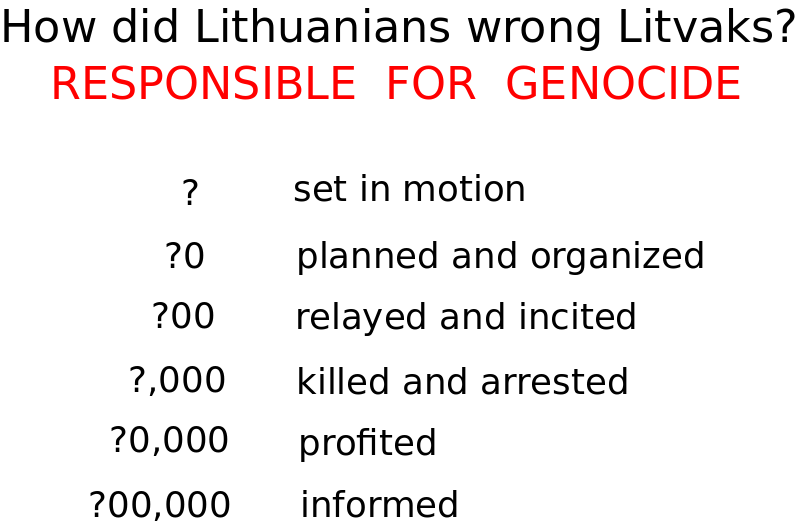
◊
Hamann’s squad consisted of only 15 Germans. How could they shoot so many Jews? There was no shortage of Lithuanians. Thousands of them arrested and shot Jews, tens of thousands shared in the profits with them, and hundreds of thousands of snitches battled against a few thousand who saved Jews.
Who set in motion this broad undertaking? Could it have flown from personal revenge? The Soviets tortured and jailed officers Bronius Norkus and Bronius Kirkila and deported their families. They took the lead in the genocide of Lithuania’s Jews. Bronius Kirkila soon killed himself. Whereas Bronius Norkus dedicated himself.
Similarly, after the war, the reknowned Litvak poet, Vilnius ghetto partisan Abba Kovner took revenge on Germans, and unsuccessfully attempted to kill six million of them.
And yet, revenge fades, distracts and clouds.
◊
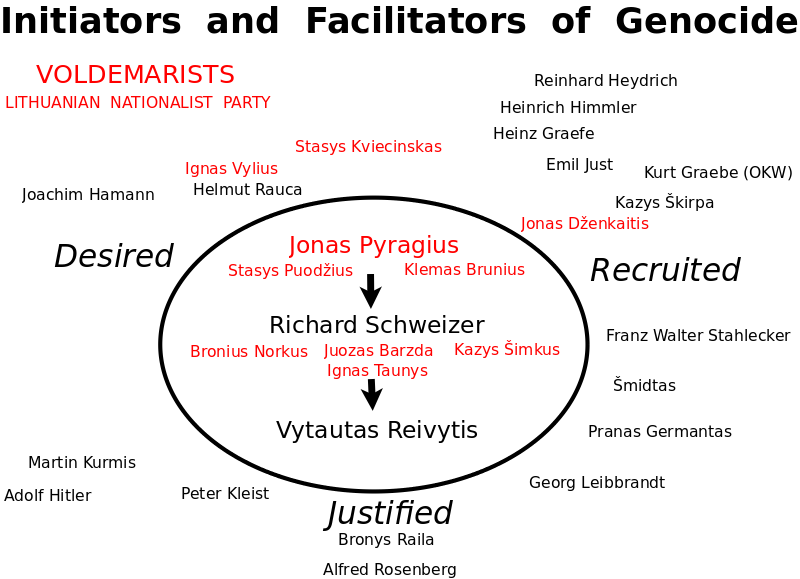
◊
Let us consider who was responsible for the killing of children, women and the elderly. Who wished for this, recruited others and justified it all?
Jonas Pyragius, Ričardas Šveiceris, Vytautas Reivytis, Ignas Taunys, Kazys Šimkus, Juozas Barzda, Bronius Norkus, Klemensas Brunius and Stasys Puodžius.
Interestingly, these were not necessarily well known or powerful people. But they were all impressive in their own way, mindful and principled. They were not in any way the dregs of society.
◊
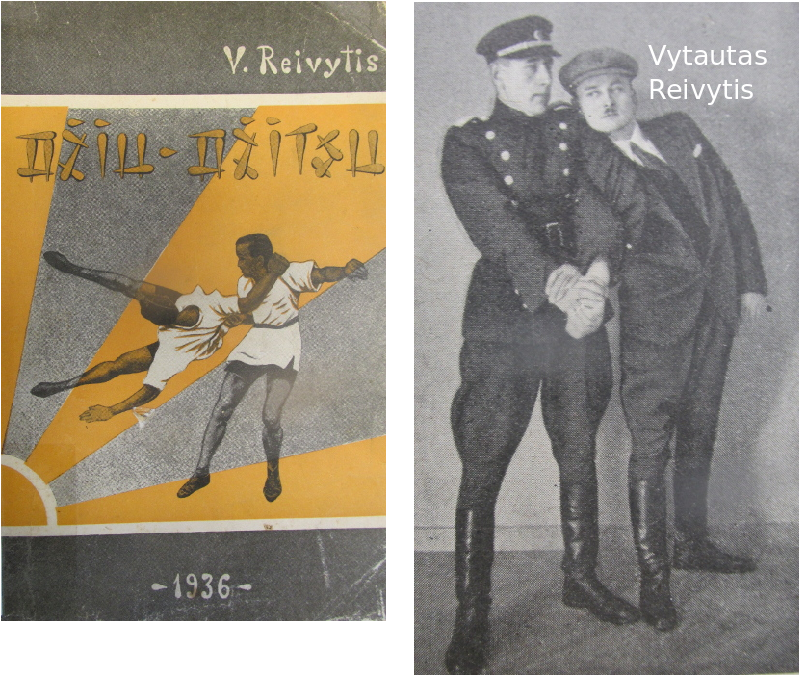
◊
Reivytis, Director of Lithuania’s Police Department, organized the arrest of Lithuania’s Jews. It is much harder to arrest than to kill. Arrests were made in the name of Lithuania. Otherwise, the police would have let the Jews get away. In the name of Lithuania, Reivytis published Policija magazine along with my grandfather Bronius Kviklys. Yet Reivytis himself desired German citizenship. He was fascinated by police morality, how superiors affect their subordinates.
Reivytis introduced Jiu-jitsu to Lithuania. He did not discriminate by sex or ethnicity. He taught that one’s instinct for self-preservation can be correct and yet one’s means of defense may sometimes be ridiculous. When lightning strikes, a woman may stick her head under a pillow. I imagine that he used his favorite illustrations in his fight against Lithuania’s Jews.
◊
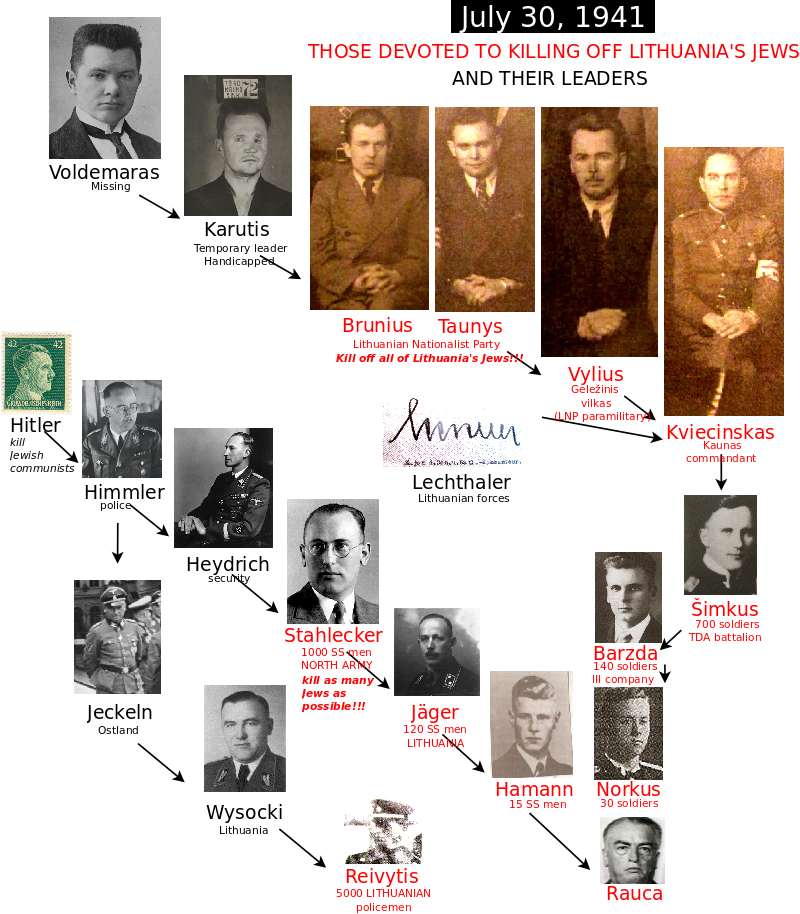
◊
Who put Reivytis in place?
The Lithuanian Voldemarists who took control of Lithuania’s military forces with their coup on July 23, 1941.Half of the Voldemarists were air force pilots. In the days of Darius and Girėnas they were most daring. Their awesomeness is most evident through their children’s eyes.
◊
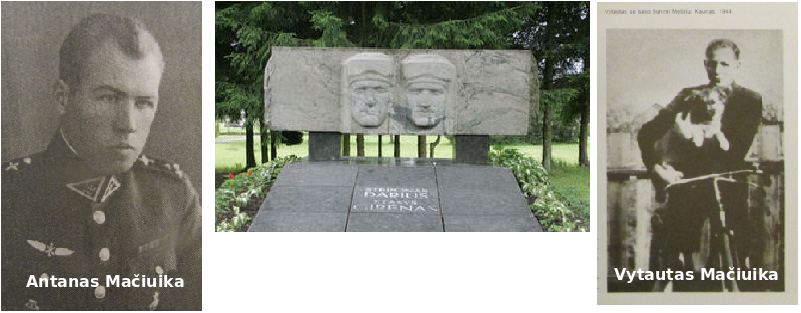
◊
Vytautas Mačiuika was 10 years old just before the war when his father, the leader of the fighter pilots, Antanas Mačiuika, died. At age 14, Vytautas joined the guerillas, and was then imprisoned by the Soviets along with his father’s friends, who adored Vytautas. Later, Vytautas portrayed these mysterious people in his autobiographical novel and vignettes. Algirdas Vokietaitis traveled to Sweden with a German peace proposal. Pyragius and Vylius set up the first radio transmissions linking Lithuanian guerillas and American intelligence. Brunius organized the Hill of Crosses. Vytautas’s mother helped saved Frida, a Jew.
Vytautas became a sculptor. He created the monument at Darius and Girėnas’s grave, as well as Grigorijus Kanovičius’s father’s tombstone. Vytautas’s brother Benediktas is one of the founders of the Santara-Šviesa intellectual movement.
◊
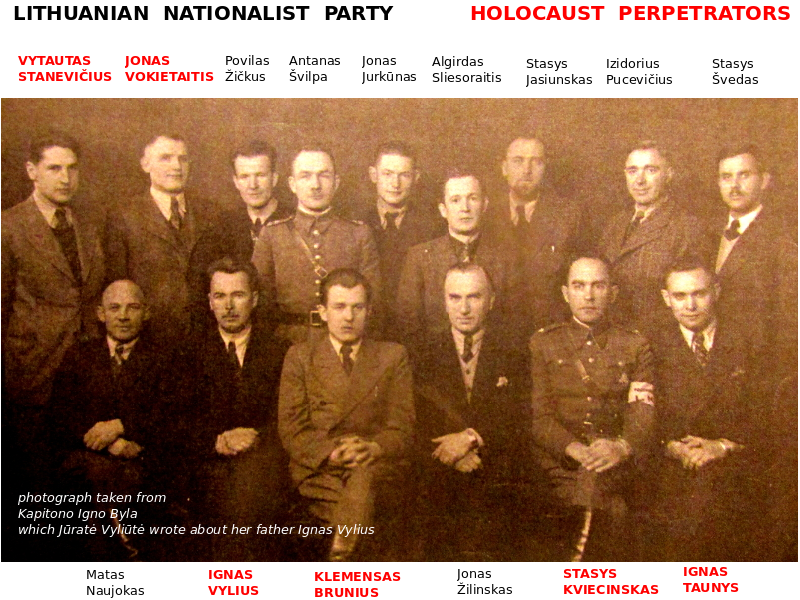
◊
Why did the Voldemarists overthrow Kaunas military commandant Jurgis Bobelis, leader of Lithuania’s military forces, and put in place Kviecinskas, Šimkus and Reivytis?
Pyragius, Taunys and Stanevičius led the coup. Also active were officers who led the killing of Jews before or afterwards: Barzda, Norkus, Šimkus and Kviecinskas. Barzda woke up his company in the middle of the night. They supported him.
The Voldemarists were unhappy that Bobelis had stopped the violence against the Jews. This has been stated by Gerardas Binkis, Bobelis’s son Kazys, and also Lithuanian Activist Front (LAF) participants who Algimantas Liekis interviewed in Chicago. It is evident from the Jaeger report’s statistics.
After the coup, Jaeger told the leaders of Lithuania’s nationalist party: This time I will save you, but if something like this happens again, you better know — heads will roll. Evidently, Pyragius got permission from the SD to overthrow the Provisional Government, but not Bobelis.
◊
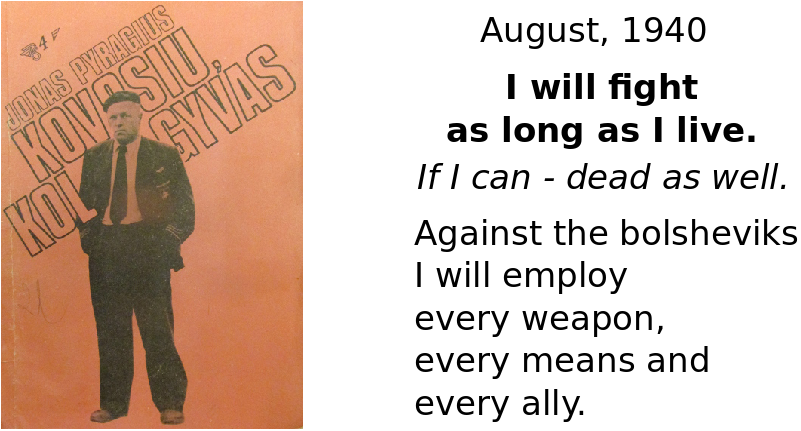
◊
Jonas Pyragius was the prime mover who resolved to kill off Jewish children, women and elders, for the sake of which he was willing even to risk his own life. Apparently, such was his national conscience.
I love my nation but I also love my self. Part of my very “I” is my national conscience. I must discover some sort of formula, which to my own self would look to be the sole truth, and toss it to my conscience so as to thereby calm it. What would I think of myself, if I were able to trick my conscience, for “I” would yet know of this deceit.
That sole truth is spoken responsibly, honestly, thoughtfully, effectively. On the occasion of Jaeger’s report, Šimkus organized a party where the nationalists’ leader Leonas Virbickas spoke how Lithuanians are used to cleaning their homes before a great celebration. Even before the war Skurauskas wrote the Lithuanian Nationalsocialist “Geležinis Vilkas” (Iron Wolf) Battle Front program in which Jews are deleted from life. Already in August, 1940, the Voldemarists wrote a letter from the Gleisgarben refugee camp to ask Kazys Škirpa to lead them in a fight against bolshevism, that is, a war against Jews. The start of it all was Pyragius’s oath in the summer of 1940.
I will fight as long as I live. If I can — dead as well. Against the bolsheviks I will employ every weapon, every means and every ally.
The ally was the Devil and the bolsheviks were the Jews — children, women and the elderly. Interestingly, for Pyragius, the Vatican was worse than bolshevism because the concept of God disarms people.
Having found those most responsible, Jonas Pyragius and the Voldemarists, their Lithuanian Nationalist Party (LNP), we can judge everybody else accordingly.
The Nationalists were opposed by Cramer, who took away their party headquarters. Lithuania’s police chief Engels beat up Norkus. The day before the coup, commandant general Robert van Pohl wrote to Bobelis to emphasize that cleansing operations were not allowed unless with Pohl’s permission.
◊
◊
Pyragius’s values are brought out by his disagreements with Lithuanian Nationalist Party general secretary Zenonas Blynas. Blynas’s position is distinguished by his concept “there is never too little blood for the earth.” This means that Lithuania’s earth cherishes even the blood of a small, shrieking person. A solemn, pagan sacrifice of Jewish lives unites us in the spirit of fascism. But the unceremonious killing of Jews has the Germans making a mockery of the Lithuanians. Lithuanians have already proven that they have the right to expect independence after the war. Whereas for Pyragius the killing off of the Jews is necessary in its own right and not to be linked with independence.
◊
◊
Values are also reflected by who chose to associate with whom. And who used whom? The Voldemarists used Škirpa and vice versa. The Lithuanians used the Germans and vice versa.
Škirpa and the Voldemarists were of like mind, especially after the Munich Agreement, that Lithuania must not be neutral, and it must side with the Germans. They called themselves activists because Lithuanians must be active like Voldemaras, not passive like Smetona. Lithuania must be organic, as wrote philosopher Maceina. Jews were not necessary in Lithuania. The Germans would appreciate their removal.
The perpetrators were generally not antisemitic. They very much wanted to win favor with Germans, and to have a union with Germany. That was the gist of it.
Starting July, 1940, Škirpa promoted ethnic cleansing. However, the LAF program written by Maceina emphasized “Christian morality,” which is to say, “thou shalt not kill.” Thus Škirpa instructed that Jews be frightened away from Lithuania. The Voldemarists looked more practically to kill them off. In March, 1941, Puodžius and Brunius recruited agents who were trained to slip into Lithuania and teach activists to organize the killing of all of the Jews.
Voldemarists understood that Škirpa’s determination to declare independence would upset the Germans. Thus secretly from him they worked with Graefe of the SD. The Germans understood that the Lithuanians were naive dupes, a nation of farmers. The Germans let the Voldemarists believe that killing off the Jews would be proof that the Lithuanian nation was worthy of arms, worthy of independence. That the Voldemarists and Škirpa were independent of the Germans is made clear by their avoidance of Germantas-Meškauskas, who they considered a German agent.
In August, 1941, Škirpa’s secretary Valiukėnas crossed Žemaitija by bicycle. He reported to the Swedes: … not a single Jew can be seen in the towns in the countryside. Most of the Jews, especially the men, withdrew and fled along with the Russian Red Army. Later he corrected himself to say that, in fact, they had not fled: The extermination of the Jews. It is the cruelest thing. A sound mind can make no sense of what in Lithuania is going on with the Jews… According to well informed sources [Voldemarists, no doubt], in all of Lithuania at the end of March, 1942 only about 30,000 Jews were left. If about 20,000 Jews fled to Soviet Russia, then in 9 months the German executive institutions have killed more than 170,000 people. Thus more than 500 innocent people have been killed each day in Lithuania alone.
◊
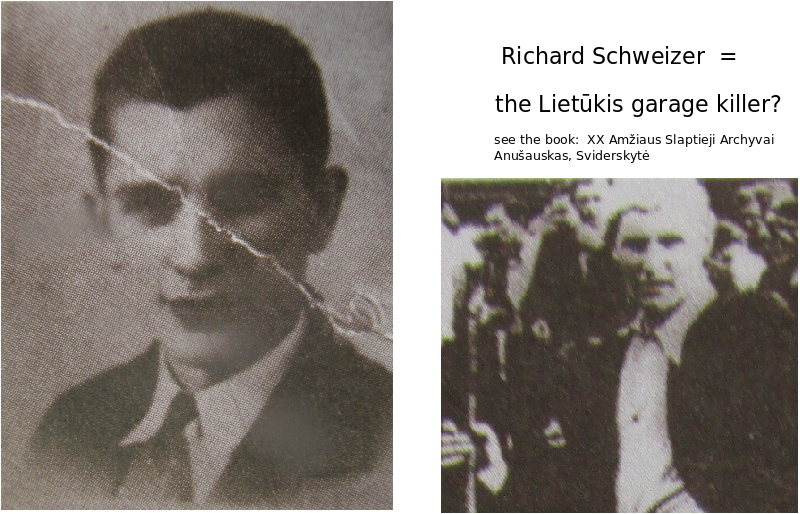
◊
Richard Schweizer (Šveiceris) was a German from Kybartai, Lithuania who at the SS training camp at Pretzsch was assigned to Stahlecker as his translator. He introduced Stahlecker to Klimaitis, Šimkus and Norkus. From 1940 to 1941, Schweizer and Reivytis worked and mingled in Eitkūnai. Schweizer is linked to the massacre at the Lietūkis garage. I think that Schweizer opened Stahlecker’s eyes to how eager the Voldemarists were to kill Jews.
Georg Gerullis (Jurgis Gerulis) was a Lithuanian German, dedicated Nazi, acclaimed linguist and rector of Leipzig university. In the fall of 1940, he helped Kazys Škirpa and LAF to connect with Germany’s armed forces supreme command (OKW) and its military intelligence, Abwehr. Subsequently, Lithuanian agents in the Abwehr — Bronius Michelevičius in Klaipėda, Bronius Aušrotas in Tilžė, and Vytautas Reivytis in Eitkūnai —provided activists with proclaimations authored by Bronys Raila and others, which in every way linked the upcoming fight for independence with ethnic cleansing. Abwehr officer Kurt Graebe fomented hopes for Lithuanian and Latvian independence, but as a Polish German minority who had been elected to Poland’s parliament, he did not belong to the Nazis and was denounced by them. Be that as it may, by May, 1941, the Abwehr, SD and the Voldemarists were working together along the Lithuanian border.
◊
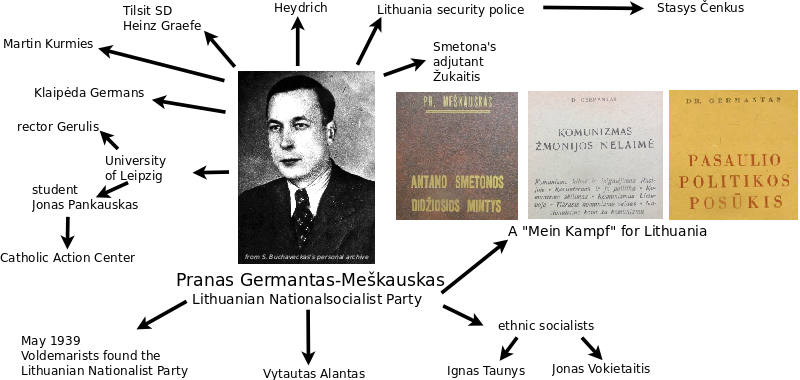
◊
Gerullis’s doctoral student, linguist, Lithuania’s security police inspector Pranas Germantas-Meškauskas had the best ties to the Germans, including Heydrich. Heinz Graefe of the SD considered him a friend and encouraged Kazys Škirpa to appoint him his deputy. It is most probable that Germantas connected the Voldemarists with Graefe and his subordinate Martin Kurmies, the only German to participate in the Voldemarist coup. Germantas was that exceptional Lithuanian who dreamed of organizing a Lithuanian nationalsocialist party and compiling for the Lithuanian nation a book that would equal Mein Kampf. He was arguably the most deceitful of Lithuanians. He compiled “Antanas Smetona’s Great Thoughts,” and was very much trusted by President Smetona, even while in June, 1939 he asked the Germans for 100,000 litas and weapons to overthrow Lithuania’s government and organize pogroms against Lithuania’s Jews. It seems likely that he was inspired by Kristallnacht, but basically sought to follow the German example as he imagined it. He lacked a conscience, but he wanted to do good. As the Counsellor for Education in Nazi-occupied Lithuania, he personally cared for poor students, aided them with the profits from the newspaper “Į Laisvę,” and protected them from being drafted into the army or sent to work in Germany. His fellow Lithuanians at the Stuthoff concentration camp chose him as their leader because he knew how to dispose the Germans favorably.
Kazys Škirpa distinguished between Germans who were good or bad for Lithuania, but truly they all worked together to realize Rosenberg’s plan of installing Lithuanian counsellors to support Nazi Germany’s occupation of Lithuania. Škirpa’s “good Doctors” Peter Kleist and Georg Leibbrandt worked out Rosenberg’s plan to deport the nations of the Occupied East and participated in the 1942 Wansee conference to plan the genocide of Europe’s Jews. Škirpa’s “bad SS man” Heinz Graefe was in charge of the killing of about 100 Jews in Grudziondze in Nazi-occupied Poland. However, when Kleist and Graefe both came to Kaunas to speak with Lithuania’s Provisional Government, they did not concern themselves with the Jews, but with implementing the Nazi-occupation of the Baltic countries.
◊
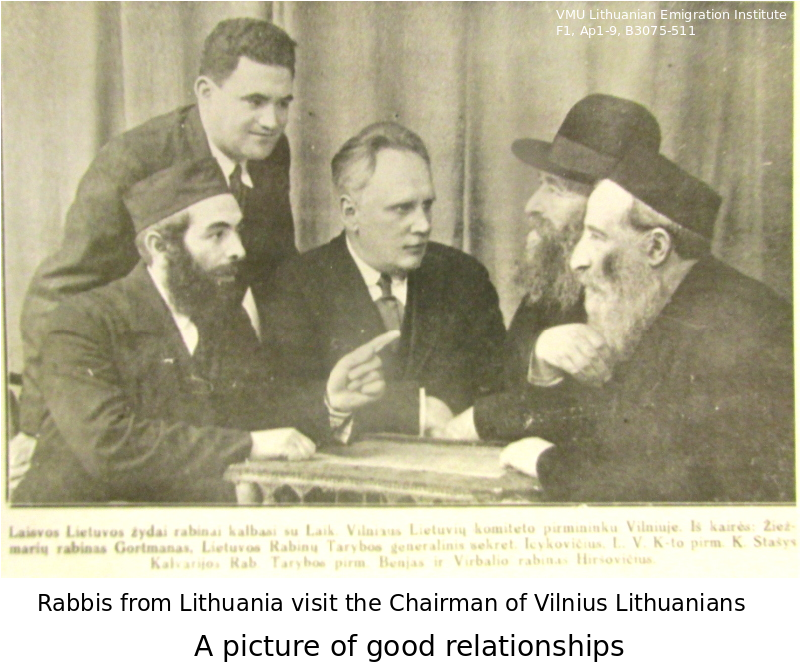
◊
Heydrich rejected Germantas’s proposal to organize pogroms for reasons which show what close ties Lithuanians and Litvaks once had. The Germans did not want to interfere with the steady emigration of Lithuania’s Jews to Palestine. In 1943, at the Cleveland Jewish Center, Antanas Smetona explained that so much capital had been flowing out of Lithuania that he and leading Jews had conspired to encourage the emigration of poor Jews and to retain the more successful ones.
As secondary, personal goals support a shared purpose, whether sacred or vile, there necessarily arises a morality, even one of thieves. And one can always give up one’s personal goal, at least in part, on behalf of another. Thus in every regime we always have a certain degree of freedom to do good.
◊
◊
The Voldemarists were tripped up by the declaration of Lithuania’s independence. That conflicted with Rosenberg’s plan of appointing counsellors. Lithuania’s Provisional Government dispatched generals who chastised Klimaitis so that he stopped organizing pogroms. The Government openly condemned the Lietūkis garage massacre, prohibited public execution, and in place of killings established a concentration camp, which I take to have been the Kaunas VII fort.
The Voldemarist plan was saved by the ethnic cleansing which Škirpa unleashed. The rebels arrested thousands of Jews. The TDA battalion founded by the Provisional Government shot 3,000 at Kaunas VII fort. Bobelis did not resist Jaeger’s order to shoot them. Chaimas Bergmanas considers this most painful as this injustice was committed by the state of Lithuania.
Ambrazevičius, Ivinskis and Girnius edited the first, uncensored issue of “Į Laisvę,” which promoted mercy for Lithuanian communists, but hatred of Jews. Jesuit high school director Kazimieras Bauba wrote the editorials, which demanded that all Jews be deported. The circulation of “Į Laisvę” reached 200,000.
◊
◊
Bobelis’s Order Nr.2, published in “Į Laisvę,” on the permit marked “Sicherheitsdient LNP” required for carrying weapons, proves that the Lithuanian Nationalist Party, the SD and the German army bypassed Škirpa as they prepared together for the upcoming war. At first, Bobelis supported this activity.
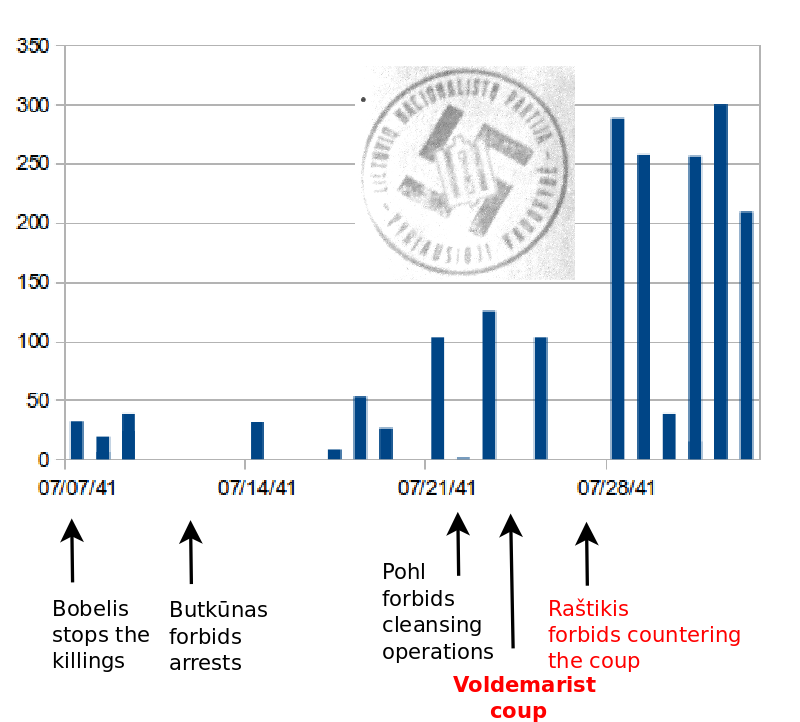
◊
Bobelis is a war criminal. The execution of 3,000 Jews on July 4-6, 1941 at Kaunas VII fort was the first of such magnitude to take place in World War II. Even so, he got involved with his concept of “Jewish volunteer soldier.” Let us recall that Goldberg was a volunteer soldier! Bobelis saved 60 volunteers from the VII fort. The volunteers were excluded from his version of the Jewish statute, which flew in the face of racism. Bobelis stopped the killing of Jews, declared the arrest of Jews to be punishable by death, and along with Palčiauskas, delayed the creation of the Kaunas ghetto. Bobelis’s sons were friends with Gerardas Binkis, the son of Sofija Binkienė, famous for the Jews she saved. Gerardas claimed that the Bobelis family hid Jews.
Architect Žemkalnis-Landsbergis’s ministry was responsible for the establishment of the concentration camp, but later his family saved Jews as well.
Whereas Minister of Defense Raštikis forbade any efforts to take back the Lithuanian battalion from the Voldemarists. Lithuanians were not to spill blood against each other. Lithuanians warred against Jews, but not against Voldemarists.
After the Lietūkis garage massacre, the Finance minister’s brother Balys Matulionis and the priest Simonas Morkūnas asked archbishop Skvireckas to intercede on behalf of the Jews. The archbishop’s representative did not find much support from Bobelis. The archbishop satisfied himself that he had done his duty as a Catholic. If the Jews had concerned him as much as his vineyards, if he would have fought for them as did Cramer or Engels or even Bobelis, then I think the Lithuanians would have been able to thwart the Voldemarists. The archbishop lacked faith that God might provide unexpected allies. He should have learned from Pyragius:
Does my neighbor not sometimes imagine, when caught by despair, that surely now Pyragius must somewhere be giving the bolsheviks a thrashing.
It may be that Lithuania’s example opened up for all of Europe the possibility of killing off all Jews. Without such a terrible example, there may have died perhaps only one million Jews, not six million.
The Voldemarist coup was a tipping point. If they had not succeeded, then the killings in the Lithuanian province might not have taken place in the summer of 1941. And if those killings had not taken place, then there may not have been a decision to kill all of the Jews. Because Hitler’s decision seems to have been driven by events coming from the bottom-up, starting in Nazi-occupied Poland, where some Germans reveled in murder, but met with resistance among German officers. This resistance is clear in Lithuania, as well. Stahlecker was sensitive to it. Hitler was very sensitive to such politics as well, as in the case of euthanasia. But he had to be feared more than anybody else. So Hitler may have likely been swayed by the initiative which won out in Lithuania and by the example that it was feasible to kill all of the Jews. Without such a decision for total annihilation, the status quo throughout the war might have been as in the ghettos in Nazi-occupied Poland. The great majority of Jews in Europe might have survived.
◊
◊
Finally, a small seed of Litvak culture which sprouted a new shoot.
Kviecinskas replaced Bobelis and the very next day ordered that all phonograph records be taken from Jews. My guess is that it was because his sixteen year old daughter Jonė was a dancer. She loved her father very much. During the war she performed as a soloist throughout Germany. Jonė hated the Nazis and once spit on a company of soldiers, but fortunately, nothing happened to her. I imagine it was because that company was subordinate to her father. And I think those phonograph records had an effect on her. Jonė Kvietys-Young became one of the pioneers of modern dance in Canada.
◊
ACKNOWLEDGMENTS
This publication is a translation from Lithuanian of my paper, “An Investigation of Responsibility: How Did Lithuanians Wrong Litvaks?” I originally presented a shorter version at the conference “Litvak Culture in Lithuania and Beyond” on December 11, 2014 at the Lithuanian Culture Research Institute in Vilnius. The original title was “‘Lithuanians Are Divided on the Jewish Question.’ An Explication of Avraham Tory’s Diary Entry for July 8, 1941. Methods of Investigating Intent.”
My interest in the subject grew out of an exchange with Grant Gochin and others who commented on an online article in Forward.com. I was concerned to clarify the truth as a basis for improving relationships between the Litvak diaspora and the Lithuanian diaspora. I was disappointed at the lack of information in Lithuanian on the Holocaust and so I authored the Wikipedia article which now appears as the first search result for “Holokaustas Lietuvoje.”
I continued my research as it grew apparent that Lithuanians had conspired violence against Litvaks. I spoke with historians Arūnas Bubnys, Saulius Sužiedėlis, Algimantas Liekis, Petras Stankeras, Liudas Truska, Vygantas Vareikis, Augustinas Idzelis and Chaimas Bargmanas and studied documents, periodicals and books at the Wroblewski Library of the Lithuanian Academy of Science, the Lithuanian Central State Archives, the Lithuanian Special Archives, the VMU Lithuanian Emigration Institute, the Martynas Mažvydas National Library of Lithuania, Lithuanian Research and Study Center, the Vilnius Jewish Public Library, the University of Chicago, the University of Illinois at Chicago and the Harold Washington Chicago Public Library.
I selected hundreds of excerpts from these many sources (see parts 1 and 2) and would now like to organize, present and translate this source material into English so as to facilitate understanding as to how Lithuanians wronged Litvaks. I think this is vital for coming to terms with the past and sharing a meaningful future. I am personally interested in restoring Litvak and Lithuanian friendship in the town of Butrimonys near where I live. In the words of conference organizer Antanas Andrijauskas, “We’re not used to hearing the truth.”
This publication is in the Public Domain, copyright-free, for you to share and use in your own best judgment.
Andrius Kulikauskas, PhD (ms<at>ms.lt), is a philosopher, artist, writer, educator, organizer and the author of “The Truth: From Relative to Absolute.”
